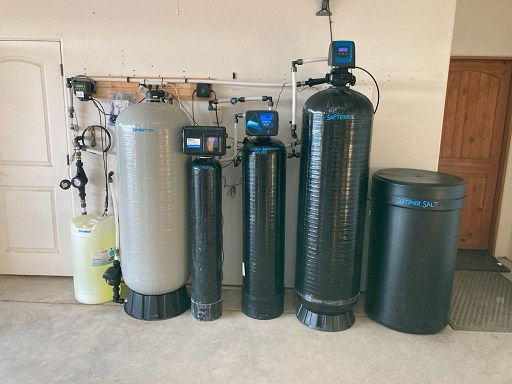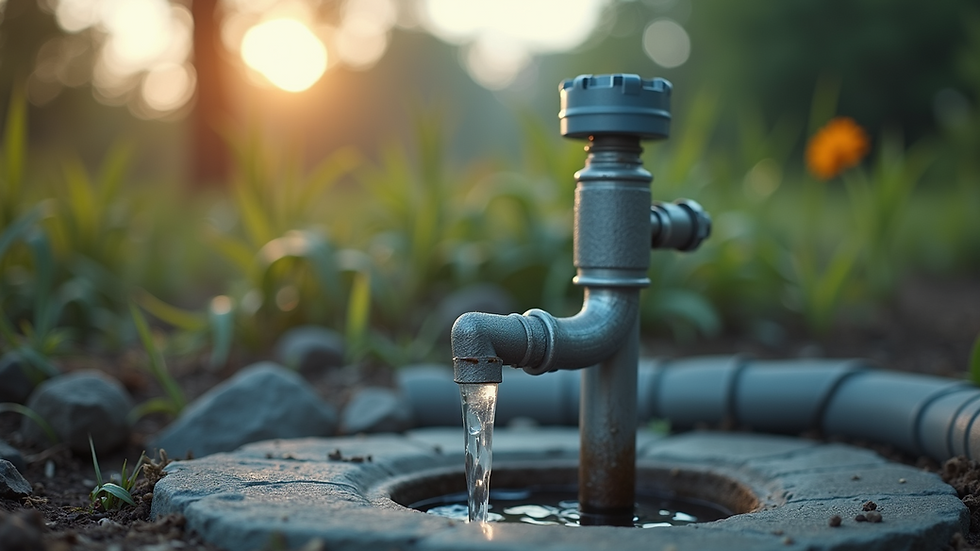Best Water Filters for Well Water
- forgachplumbing
- Jun 17
- 4 min read

When it comes to the safety of your drinking water, nothing is more important than ensuring your well water is clean. Various contaminants can lurk in well water, including bacteria, heavy metals, and sediments that could jeopardize your health. Installing a reliable water filtration system is one of the best ways to ensure your family has access to pure water. This blog post explores the best water filters designed for well water, empowering you to make an informed choice for your home.
Understanding Well Water Contaminants
Well water is drawn directly from underground aquifers, and its quality heavily depends on location and various environmental factors. Here are several common contaminants you might encounter:
Bacteria and viruses: Microorganisms like E. coli can infiltrate your well from surface runoff, posing severe health risks. According to the CDC, approximately 2.2 million people each year become ill from diseases spread through contaminated water.
Heavy metals: Elements such as lead, arsenic, and iron can leak into your water supply from soil or industrial pollution. Research shows that about 50% of private wells in some regions contain unsafe levels of arsenic.
Sediments: Particles like sand and silt can cloud the water and alter its taste, making it less palatable.
Chemicals: Pesticides and fertilizers easily contaminate well water, particularly in agricultural areas. A study found that up to 20% of wells near farmland may have detectable pesticide levels.
Understanding these potential threats is crucial when selecting the right water filter for your well.
Types of Water Filters for Well Water
When filtering well water, several filtration systems can serve your needs. Each type boasts unique advantages and is suited to specific contaminant profiles.
1. Reverse Osmosis Systems
Reverse osmosis (RO) systems excel at removing various contaminants, including dissolved solids, heavy metals, and microorganisms. This process entails pushing water through a semipermeable membrane, allowing only clean water to pass through.
Advantages:
Capable of removing up to 99% of contaminants.
Enhances water taste and odor.
Disadvantages:
Slow water processing rate, often supplying 50 to 100 gallons per day.
Requires regular maintenance and filter replacement, usually every 6 to 12 months.
2. Activated Carbon Filters
Activated carbon filters are famous for their ability to improve taste and odor by eliminating chlorine, sediments, and other organic compounds. They can be standalone units or integrated as part of a larger system.
Advantages:
Affordable and easy to maintain.
Highly effective for improving taste and smell.
Disadvantages:
Limited in removing minerals and heavy metals.
Frequent filter changes, often recommended every 3 to 6 months.
3. Whole House Filtration Systems
Whole house filtration systems link directly to your home's main water supply, filtering all water used in your household. These systems often combine multiple filtration methods, such as sediment filtration and activated carbon filtration, making them versatile against a wide array of contaminants.
Advantages:
Provides filtered water for all household activities, including drinking and bathing.
Reduces plumbing issues tied to sediment buildup, which can save costs on repairs.
Disadvantages:
Higher initial investment than point-of-use systems.
Generally requires professional installation and maintenance.
Key Features to Consider When Choosing a Water Filter
Carefully considering various key features is essential when selecting a water filter for well water:
1. Contaminant Removal Capabilities
Identify the specific contaminants you want to eliminate from your well water. Some filters are designed for certain types, which may mean they lack effectiveness against others. Choose a filter that aligns with your water quality needs.
2. Flow Rate
The flow rate is a critical factor for households with higher water usage. Select a system that can deliver a sufficient amount of filtered water daily while maintaining adequate pressure. Systems advertised with high flow rates, such as 10 gallons per minute, can help keep up with demand.
3. Maintenance Requirements
Evaluate the maintenance obligations of various filter types. Some systems demand minimal upkeep and filter changes, while others may require regular professional checks, which could add to the overall cost.
4. Certification
Look for filters certified by reputable organizations like the Water Quality Association (WQA) or NSF International. These certifications guarantee that the filter meets rigorous performance standards.
Top Recommendations for Water Filters for Well Water
Now that you understand the types and important features of water filters for well water, here are some top-rated products currently available on the market:
1. APEC ROES-50 Reverse Osmosis System
The APEC ROES-50 is a leading RO system known for its effectiveness in removing contaminants and enhancing water taste. Ideal for medium-sized families, this unit can provide up to 50 gallons of filtered water daily.
Pros:
Straightforward installation process.
Comprehensive removal of a wide array of contaminants.
2. Aquasana Whole House Water Filter System
The Aquasana system stands out for its multi-stage filtration process, including sediment and carbon filters to tackle a broad range of contaminants while ensuring strong water flow throughout the entire home.
Pros:
Low maintenance with user-friendly filter replacement.
Capable of removing up to 97% of chlorine and many heavy metals.
3. Home Master TMHP HydroPerfection Reverse Osmosis System
The Home Master TMHP features a robust RO filtration system enhanced with a UV filter for additional protection against bacteria and viruses, making it an excellent choice for families relying on well water.
Pros:
Comprehensive multi-layer filtration system.
Simple filter change process that does not require professional help.
Maintenance Tips for Your Water Filter
To ensure the longevity and effectiveness of your water filter, follow these maintenance tips:
Schedule regular inspections: Arrange for an annual examination to identify and resolve issues early on.
Replace filters on schedule: Follow the manufacturer's guidelines for when to replace filters to ensure the system operates at peak performance.
Monitor water quality: Conduct periodic water tests to confirm that your filter meets your specific water safety standards.
Making the Right Choice for Clean Water
Investing in a dependable water filter for well water significantly impacts your health and the taste of your water. With various options like reverse osmosis systems, activated carbon filters, and whole house systems available, selecting the best fit for your household is vital.
By understanding the unique contaminant profile of your well water and prioritizing features such as contaminant removal effectiveness and maintenance requirements, you can confidently enjoy clean and safe drinking water for your family for years to come.





Comments